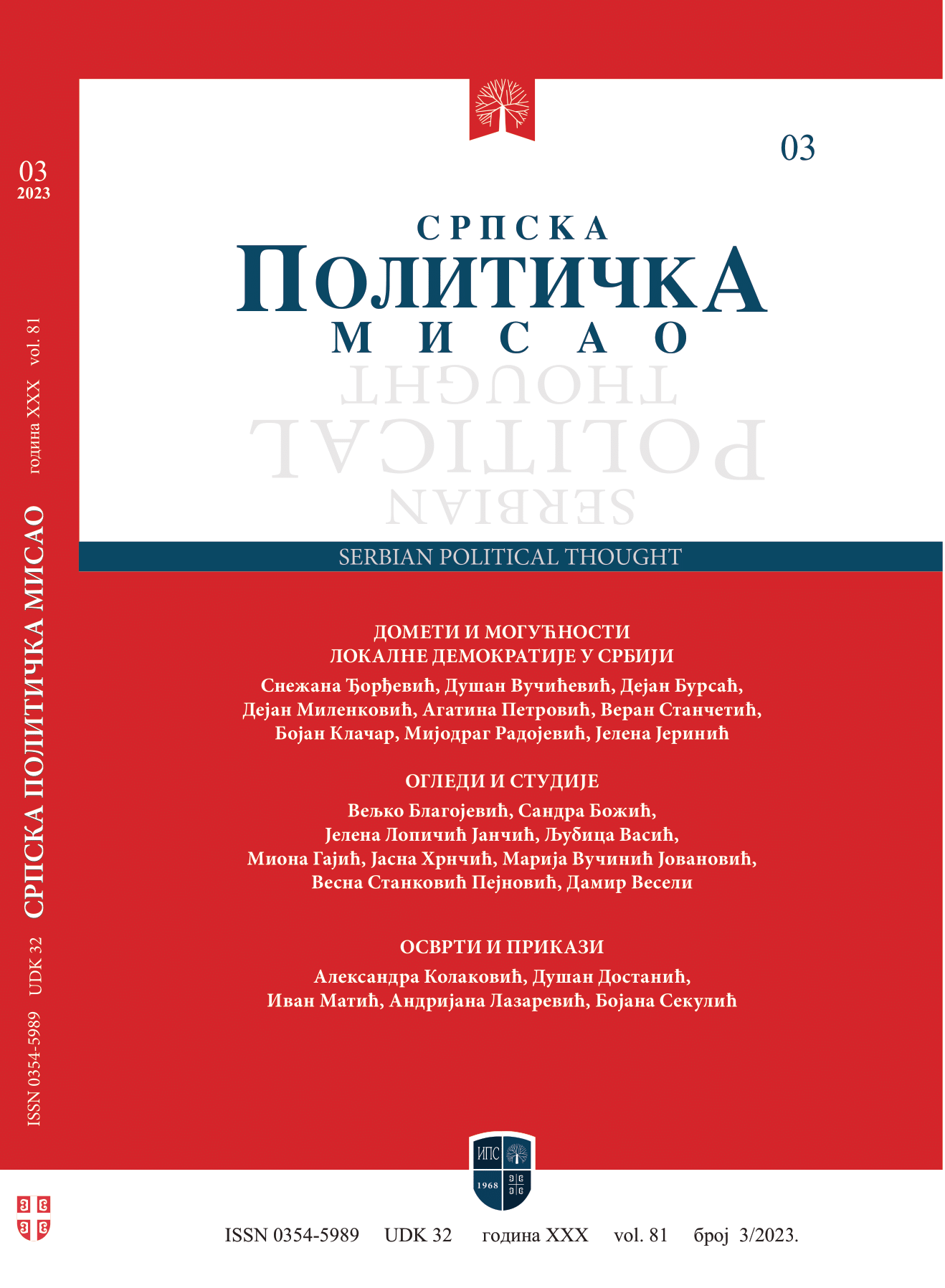Institutional framework of youth organization in local self-government units in the Republic of Serbia - problems and potential solutions
Abstract
The paper analyzes the institutional mechanisms of youth participation in the creation and implementation of public policies, with a focus on the local level. The paper highlights the importance of young people’s social capital for the development of a healthy and sustainable community. Through active participation, formal and informal association, and continuous communication with local institutions, young people develop opportunities to express and fulfill their rights and needs, while contributing to the overall development of the local community. The Law on Youth, which was adopted in the Republic of Serbia over 10 years ago, determines the ways of organizing youth, but there have been numerous problems in its implementation. Using the metod of content analysis of legal norms, primarily the Law on Youth and National Youth Strategies, institutional problems of youth organization are presented, and specific normative solutions that could become part of a new youth law are proposed. Special emphasis is placed on the institutional framework of youth organization at the local level, where youth offices, youth spaces and youth work are analyzed. The results of the analysis have shown numerous problems resulting from unclear and insufficiently developed provisions of the law on these issues. Additionally, the paper presents comparative solutions for the same issues in certain European Union member states and Western Balkans countries.
References
Закон о младима, „Службени гласник Републике Србије“, бр. 50/11 и 116/22 – др. закон.
Игњатовић, Сузана и Смиљка Томановић. 2011. „Социјални капитал и простор.“ Социологија и простор. 49 (3/191): 269-289. дои: https://doi.org/10.5673/sip.49.3.1.
Јанковић, Дејан. 2020. Друштвене промене и рурални развој: значај социјалног капитала, партиципације и друштвених мрежа. Нови Сад: Универзитет у Новом Саду Пољопривредни факултет.
Миленковић, Дејан. 2012. Коментар Закона о младима. Београд: Београдска отворена школа.
Миленковић, Дејан. 2013. Партицвипација и учешће младих у друштвеним процесима у Републици Србији. Београд: Центар за нову политику.
Миленковић, Дејан. 2023. Компаративна анализа закона о младима у Европским земљама. Београд: УНИЦЕФ.
Национална асоцијација канцеларија за младе. н.д. „Историјат.“ Национална асоцијација канцеларија за младе. Последњи приступ 20. јун 2023. https://asocijacijakzm.org/istorijat/.
Национална стратегија за младе за период од 2009. до 2014. године, „Службени гласник Републике Србије“, бр. 55/08.
Национална стратегија за младе за период од 2015. до 2025. године, „Службени гласник Републике Србије“, бр. 22 од 27. фебруара 2015.
Национална стратегија за младе у Републици Србији за период од 2023. до 2030. године, „Службени гласник Републике Србије“, бр. 9/23.
Павићевић, Оливера. 2011. „Позитивни и негативни аспекти друштвеног капитала – случај посткомунистичких друштава“ Социологија. 54 (3): 501-526. дои: https://doi.org/10.2298/SOC1203501P.
Томановић, Смиљка, Драган Станојевић, Исидора Јарић, Душан Мојић, Слађана Драгишић Лабаш, Милана Љубичић, и Ивана Живадиновић. 2012. Млади – наша садашњност. Истраживање социјалних биографија младих у Србији. Београд: Чигоја штампа; Институт за социолошка истраживања Филозофског факултета у Београду.
Устав Републике Србије, „Службени гласник Републике Србије“, бр. 98/06, 115/21.
Azanjac, Tanja, Donatella Bradic, Djordje Krivokapić, and Tatjana Stojic. 2014. Youth and Public Policy in Serbia. Youth Policy Press.
Campbell, David and Nancy Erbstein. 2012. “Engaging youth in community change: three key implementation principles.” Community Development. 43 (1): 63-79. doi: https://doi.org/10.1080/15575330.2011.645042.
Henn, Matt, Mark Weinstein and Sarah Hodgkinson. 2007. “Social Capital and Political Participation: Understanding the Dynamics of Young People's Political Disengagement in Contemporary Britain.” Social Policy and Society. 6 (4): 467-479. doi: https://doi.org/10.1017/S1474746407003818.
Ilišin, Vlasta, Dejana Bouillet, Dunja Potočnik, i Ivona Mendeš. 2006. Mladi između želja i mogućnosti – položaj, problem i potrebe mladih Zagrebačke županije. Zagreb: Institu za društvena istraživanja u Zagrebu.
Jarrett, L. Robin, Patrick J. Sullivan, and Natasha D. Watkins. 2005. “Developing social capital through participation in organized youth programs: qualitative insights from three programs.” Journal of community psychology. 33 (1): 41-55. doi: https://doi.org/10.1002/jcop.20038.
Kapucu, Naim. 2011. “Social Capital and Civic Engagement.” International Journal of Social Inquiry. 4 (1): 23-43.
Knight, Yolande. 2009. “Talkin' 'both my generation: a brief introduction to generational theory.” Planet. 21(1): 13-15. doi: https://doi.org/10.11120/plan.2009.00210013.
Stoker Gery i David Marsh. 2005. Teorije i metode političke znanosti. Zagreb: Fakultet političkih znanosti.
U Report Srbija. 2023. „Ankete.“ U Report Srbija. Последњи приступ 23. јун 2023. https://serbia.ureport.in/opinions/.
Watson-Thompson, Jomella, Stephen B. Fawcett, and Jerry A. Schultz. 2008. “A framework for community mobilization to promote healthy youth development.” American Journal of Preventive Medicine. 34 (3): S72-S81. doi: https://doi.org/10.1016/j.amepre.2007.12.016.
Woodman, Dan. 2016. “The sociology of generations and youth studies.” In Routledge handbook of youth and young adulthood, second edition, ed. Endy Furlong, 20-27. New York: Routledge.

